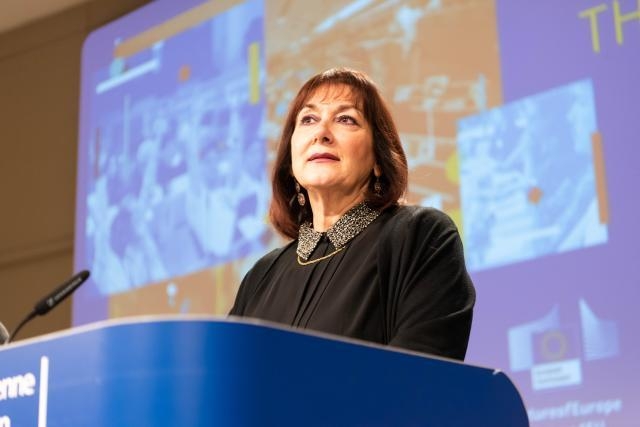EU-Kommission zur Konferenz zur Zukunft Europas: Offen für die ambitionierten Pläne des Europaparlaments

Heute Mittag hat die EU-Kommission ihre Position zur Konferenz für die Zukunft Europas vorgestellt. Die kroatische Stellvertreterin von Kommissionspräsidentin von der Leyen, Dubravka Šuica (beide Christdemokraten), schlägt vor sowohl über EU Politik zu diskutieren als auch über Demokratie und Institutionen, inklusive Spitzenkandidaten und transnationale Listen. Das Parlament hatte auf Vorschlag der Grünen aus allen EU-Bürgern zufällig geloste und für die EU-Bürger insgesamt repräsentative Bürgerversammlungen (Agoras) als innovative Form der Bürgerbeteiligung vorgeschlagen. Die Kommission will ausdrücklich von Erfahrungen in Mitgliedstaaten mit solchen Bürgerversammlungen lernen und erwägt Panels von Bürgern und Experten während der Konferenz zu nutzen.
Die EU-Kommission vermeidet die Erwähnung von möglichen Änderungen der Europäischen Verträge als Ergebnis der Konferenz, bestätigt die Offenheit erst auf Nachfrage in der Pressekonferenz. In ihrem Arbeitsprogramm hatte sich Kommissionspräsidentin Ursula von der Leyen noch ausdrücklicher offen hierfür gezeigt. Auch das Parlament hatte in seinem Beschluss vom 15. Januar 2020 explizit auch Vertragsänderungen ins Spiel gebracht.
Daniel Freund, Verhandlungsführer der Grünen im Europaparlament zur Konferenz Zukunft der EU kommentiert:
“Die EU-Kommission bringt an diesem Mittwoch einen Reformprozess auf dem Weg, der zu einem der prägendsten Projekte der Legislatur von Kommissionspräsidentin Ursula von der Leyen werden kann. Es ist gut, dass die Kommission sich offen für die ambitionierten Pläne des Europaparlaments zeigt. Bürgerversammlungen nach irischem und französischem Vorbild sollen eine zentrale Rolle spielen. Wir müssen die Europäischen Bürgerinnen und Bürger von Beginn an mitnehmen, damit die Konferenz zu einem Erfolg wird.”
“Ich hatte von der Kommission allerdings ein klares Bekenntnis zu Vertragsänderungen erwartet. Wenn wir die Europäische Union demokratischer und schlagkräftiger machen wollen, dürfen wir nicht krampfhaft am Status Quo festhalten. Dass der Weg dorthin am Ende nur über Vertragsänderungen führen kann, ist klar.”
“Die Konferenz zur Zukunft der EU ist eine enorme Chance, die EU fit für die Zukunft zu machen und längst überfällige Reformen auf den Weg zu bringen. Damit der Prozess aber wirklich Früchte trägt, müssen die Regierungen ihre Blockadehaltung aufgeben. Kommission und Rat müssen den Bürgern jetzt zeigen, dass sie es ernst meinen mit Reformen.”
_____
HINTERGRUND 1 – Mitteilung der EU-Kommission:
Wichtige Sätze aus der Mitteilung der Kommission:
– As a major pan-European democratic exercise, the Conference will be a new public forum for an open, inclusive, transparent and structured debate with citizens around a number of key priorities and challenges. … It will be open to civil society, the European institutions and other European bodies, including the Committee of the Regions, the European Economic and Social Committee, as well as national and regional authorities, parliaments and other stakeholders – all contributing as equal partners.
– The Conference should be framed around the EU’s headline ambitions, as set out in the Commission’s six Political Priorities and the European Council’s Strategic Agenda. … The second strand should focus on addressing topics specifically related to democratic processes and institutional matters, including the lead candidate system for the election of the President of the European Commission and transnational lists for elections to the European Parliament.
– The Conference must draw from the experience of different forms of citizens’ consultations and participatory democratic events, such as the citizens’ assemblies organised in Member States. … The Commission is ready to explore, with the other EU institutions, the most effective way of ensuring that what citizens debate is ultimately translated into EU policy-making. This could take the form of issue-specific deliberative panels organised by the European institutions, gathering citizens and experts at regular intervals throughout the Conference. These panels could hear contributions gathered in the framework of the Conference, as well as the views of stakeholders and elected representatives and then reflect how best to follow-up with recommendations for action.
– In the Political Guidelines, President von der Leyen has therefore pledged to follow up on what is debated and agreed during the Conference. This is a key deliverable and a novelty of the Conference, which should ultimately show that participating in democracy is a constant process that thrives beyond elections.
HINTERGRUND 2 – Vertragsänderungen in Kerndokumenten zur Konferenz
Ursula von der Leyens Politische Richtlinien zur Konferenz:
“The Conference should bring together citizens, including a significant role for young people, civil society and European institutions as equal partners. The Conference should be well prepared with a clear scope and clear objectives, agreed between the Parliament, the Council and the Commission. I am ready to follow up on what is agreed, including by legislative action if appropriate. I am also open to Treaty change. Should there be a Member of the European Parliament put forward to chair the Conference, I will fully support this idea.”
Aus dem Deutsch-Französischen Non-Paper zur Konferenz:
“The Conference should focus on policies and identify, by blocks of policies, the main reforms to implement as a matter of priority, setting out the types of changes to be made (legal – incl. possible treaty change, financial, organizational etc.)”
Aus der Resolution des Europaparlaments vom 15. Januar 2020:
“Commits itself to a genuine follow-up of the Conference without delay, with legislative proposals, initiating treaty change or otherwise; calls on the other two institutions to make the same commitment;”
HINTERGRUND 3 – nächste Schritte
28. Januar: Der Rat der Mitgliedstaaten könnte als Allgemeiner Rat seine Position beschließen
30. Januar: erstes Treffen der Präsidenten der 3 wichtigsten EU-Institutionen zur Konferenz zur Zukunft Europas: Ursula von der Leyen für die EU-Kommission, David Sassoli für das Europaparlament und Charles Michel für den Europäischen Rat
9. Mai: angestrebter Start der Konferen

